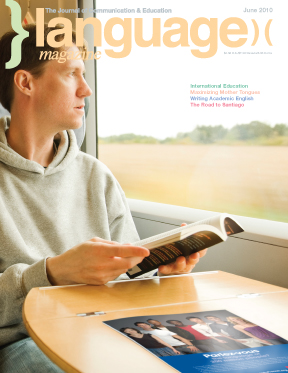Communicate Period
The administration’s Race to the Top scheme is only the latest in a long line of attempts to “fix” our educational system — all of which have neglected the fundamental changes in our society that have occurred over the last 20 years and are likely to accelerate over the next decades.
Communications have taken on a whole new meaning thanks to technological developments — our computers can teleconference for free with contacts on the other side of the world, and we can even game on our cell phones with intercontinental friends. Air travel is a fraction of its cost a generation ago and international calls are no longer a race against time. We refer to ours as the information age when we might be more accurate labeling it the communication age. However, our schools do not focus on communication as the valuable skill it has proved to be. Sure, we emphasize reading and literacy, pay lip service to geography and history, and dabble with languages and cultural studies, but we fail to integrate these skills into a practical foundation for effective communication — probably the most valuable skill you can give any child.
In our children’s world, the biggest neighborhood employer is as likely to be a Chinese conglomerate as the local Walmart, yet our children will have little chance of succeeding in a real global village without the linguistic and cultural training that will enable them to understand and communicate with the billions of potential clients all around the world.
At the same time, our own communities have rapidly changed as the world has experienced its largest waves of immigration in history, so even those who eschew the online world would be well-advised to add language and cultural expertise to their skill set in order to maximize their potential.
Very soon, it will no longer be enough to be a monolingual engineer. Employers will be able to choose from international pools of qualified, experienced, multilingual candidates whose cultural competency will make them difficult to reject.
We need to infuse the instruction of world languages and cultures throughout our educational system immediately. Ideally, every child would have the opportunity to experience cultural and linguistic immersion through a study abroad program but since budgets will not stretch that far, we must explore other opportunities for developing intercultural communication. The possibilities of online relationship building through mutual understanding of languages and culture are endless (and safe nowadays thanks to the advent of secure educational communities). And many of us are lucky enough to live in areas with large immigrant communities where a pseudo-immersion experience is only a bus ride away.
We can hardly imagine how technology will transform communications by 2050 but we do know that our children deserve the chance to benefit from the opportunities and excitement that our global village offers. It is our responsibility to give them the chance to participate in this new world. Only through learning about different cultures and languages can they acquire the tools they will need to build a new global society based on mutual respect and understanding. Continuing to ignore the communication benefits offered by world language and culture programs will leave our next generation of Americans so far behind that history will be their only solace.
IN THIS ISSUE:
Maximizing Mother Tongues
Laetitia Chanéac-Knight suggests we build on the importance
of heritage languages
Avoiding Six Study Abroad Pitfalls
Fred Dervin explains how preparing students to go beyond stereotypes will help them make the most of international education
Academic Assimilation
Assunta Martin examines how culture affects the writing of academic English by international students
International Education News
The latest on global study
Spanish One Step at a Time
Kate Sommers-Dawes follows a learning path that leads
to more than fluency
Last Writes
Richard Lederer on the real lives of teachers
Plus all the latest news in language learning technology, book reviews, and source information on language funding






